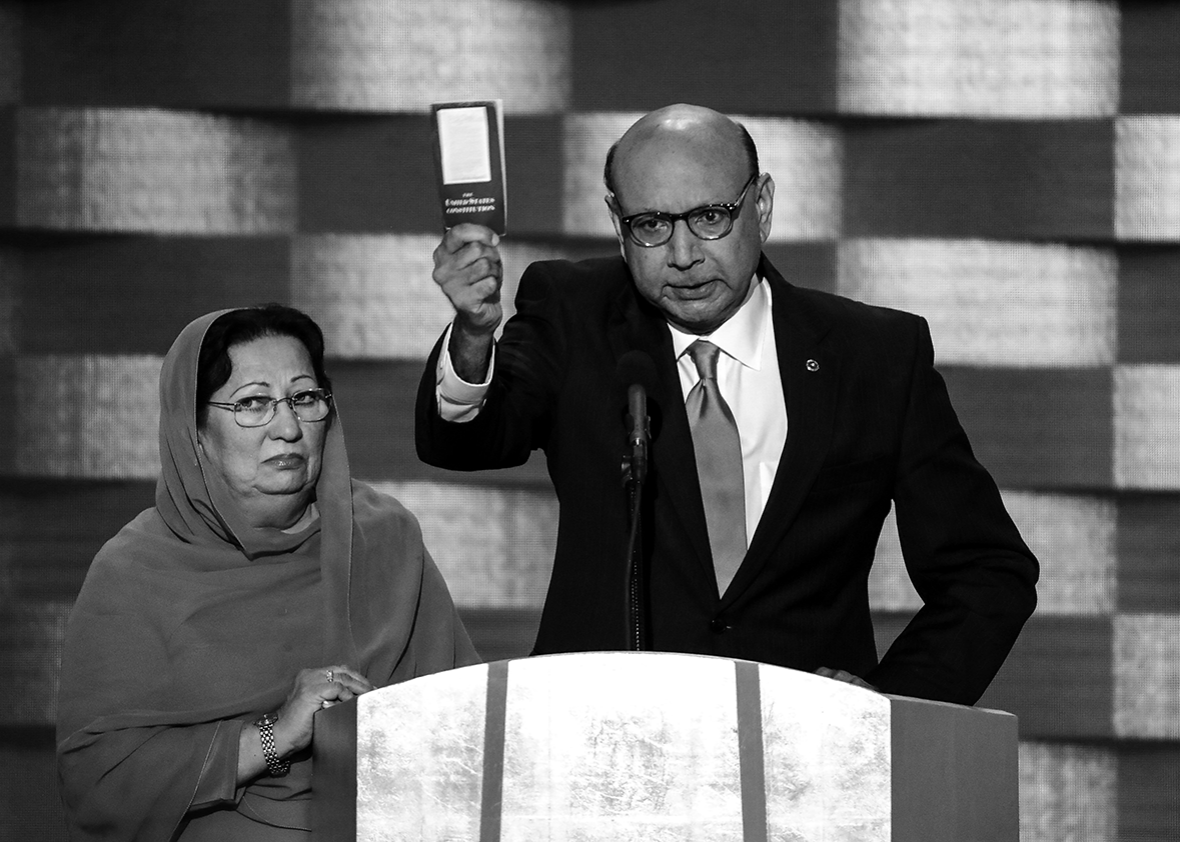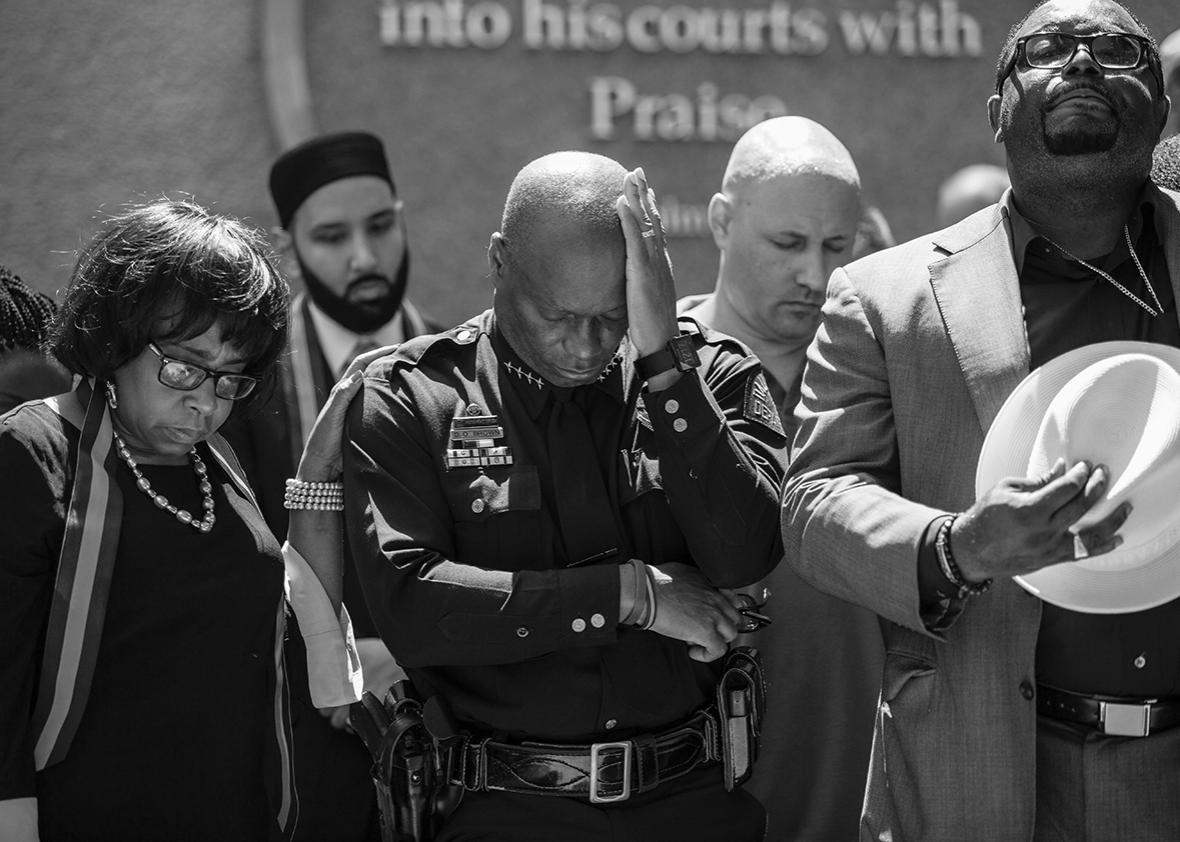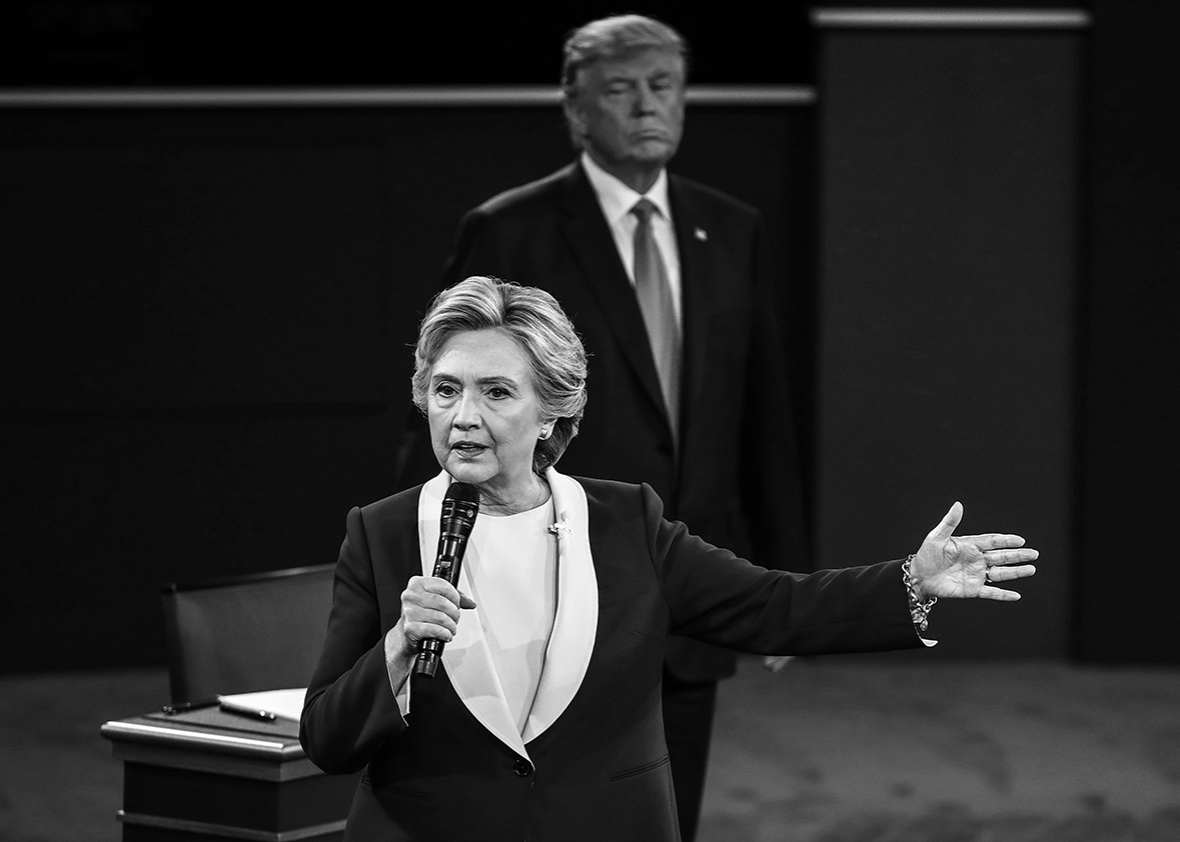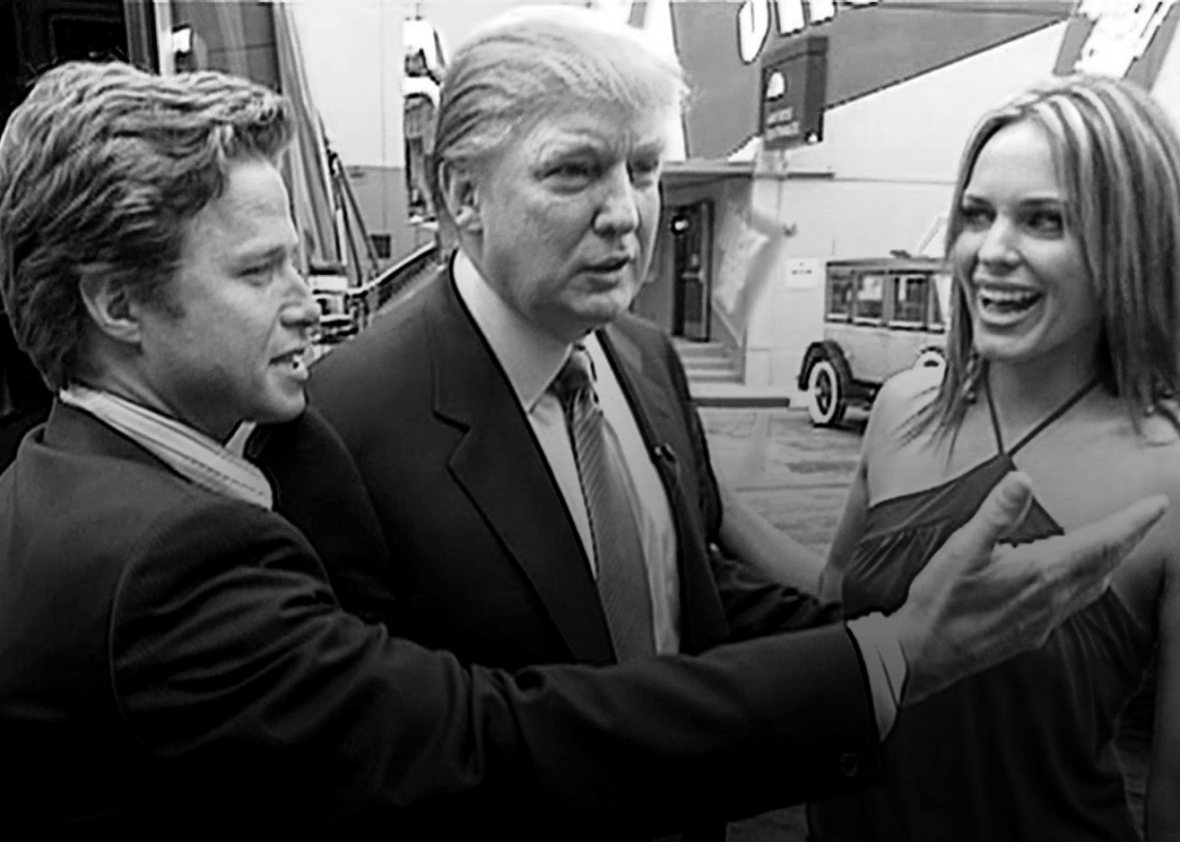This Election Was About the Issues
Not the familiar stuff of Washington gridlock, but the most important issues of our time: misogyny, racism, and xenophobia.

Alex Wong/Getty Images
“When this election is finally over,” New York Times columnist Paul Krugman tweeted recently, “I’m planning to celebrate with an orgy of ... serious policy discussion. Won’t it be great?”
Now, Krugman is not at all a creature of the Beltway consensus, and neither is he possessed of the terminal seriousness that afflicts so many of its communicants. But here he was sounding the great gasbag lament of 2016: This election hasn’t been about the issues.
You heard this a lot during the debates between Hillary Clinton and Donald Trump. “All eyes were not on the issues,” the Brookings Institution moaned after the second debate, and after the third, FiveThirtyEight rejoiced when for a moment “the issues returned to center stage.” You heard versions of this, too, from partisans and hacks. “You are fascinated with sex,” Newt Gingrich (!) told Megyn Kelly, “and you don’t care about public policy.” In August, Trump’s campaign manager, Kellyanne Conway, whined, “Hillary Clinton gave an entire speech this week about name-calling, not about the issues.” In September, Clinton’s campaign manager, Robbie Mook, sighed, “It’s just sad that we can’t have an actual discussion about the issues because Donald Trump doesn’t have a command of the issues.”
The issues. These are conjuring words, deployed to summon an air of adult purpose. In public discourse they tend to be pronounced with an unctuous reverence, in the same way you might say “the children” or “the national debt” or “the Yankees.” Do not be taken in. This election was about the issues. I don’t mean the phony ones that get bruited by the likes of Paul Volcker and Peter Peterson, both of whom could recently be found mewling in the pages of the New York Times about the deficit, a matter so fake and remote from the actual life of the country that the Times might as well have inveighed against chemtrails or published a dispatch from Glocca Morra. I’m talking about issues that involve the fundamental arrangements of American life, issues of race and class and gender and sexual violence. These are the things we’ve argued about in the past year and change, sometimes coarsely, sometimes tediously, but very often illuminatingly. This has been, by all but the most fatuous measures, an issue-rich campaign.
Pick any matter of consequence, and chances are it was aired at length during the presidential campaign. (Well, almost any. Climate change got stiffed after the primaries.) Just a month ago, we had the vice presidential candidates debate urban policing, stop-and-frisk, and the concept of implicit racial bias, though perhaps debate is too strong a word. In truth it wasn’t so much a debate as it was one guy acknowledging the existence of implicit bias and the other guy looking around the room for a hole to dive into. “But, senator, please,” Mike Pence said to his Democratic counterpart, Tim Kaine, “enough of this seeking every opportunity to demean law enforcement broadly by making the accusation of implicit bias every time tragedy occurs.” Pence’s answer might’ve been the thinnest possible slice of the very whitest bread, but it occasioned a conversation over the following days about submerged and structural biases and how they shape inequality.

Laura Buckman/AFP/Getty Images
“I want white people to recognize that there is systemic racism,” Clinton said at a Democratic primary debate in April, and even by that point she was only offering up a commonplace. Race was the home chord of 2016, in part because Trump’s campaign was from the start an instrument of racial reaction and xenophobia, and in part because the Democratic party, blacker and browner now, could at last talk about race as a central force in American life, not as a matter on which white people needed to be put at ease. Clinton spoke of mass incarceration and criminal justice in her first campaign speech, in June 2015, and over the course of the primaries her and her husband’s inglorious legacies on these counts—“superpredators,” the execution of Ricky Ray Rector, the federal crime bill of 1994—were the subjects of constant, meaningful disputation. Meanwhile, in the first presidential debate, Clinton took care to exhume Trump’s history of housing discrimination before connecting it to more memorable moments of his oafish racism, including his relentless birtherism and his treatment of a former Miss Universe named Alicia Machado. “But, remember,” she said. “Donald started his career back in 1973 being sued by the Justice Department for racial discrimination because he would not rent apartments in one of his developments to African Americans, and he made sure that the people who worked for him understood that was the policy. … So he has a long record of engaging in racist behavior.” (Trump certainly didn’t do much to hide his racist fantasies. “You’re living in poverty. Your schools are no good. You have no jobs,” he said, relating his Death Wish vision of black life in inner cities. “Fifty-eight percent of your youth is unemployed. What the hell do you have to lose?”)
Because of the nature of Trump’s appeal and because of the Bernie Sanders insurgency—which struck all the vital themes the John Edwards campaign did in 2008 but with all the huckleberry and horndog stripped away—these questions of race were inextricably bound up with questions of class. Lord knows how many spotted-owl habitats were pulped for the sake of lord-knows-how-many presumptuously empathic, tender, longform portraits of the white working class. But the blind spots in the genre’s analysis—principally a failure to appreciate the entwinement of racial resentment and economic self-interest—told a story on their own. They were of a piece with the broader initial failure among politicos to see the arbitrage play on which Trump’s candidacy was premised: Having grown estranged from the party’s establishment and its strain of Chamber of Commerce conservatism, the voters in the Republican base were primed for a candidate making apocalyptic promises about restoring their status relative to the nonwhites who seem ever to be gaining on them. And while its class determinism was too often overstated, the Sanders campaign suffered from a similar lacuna, overrating its appeal to poor whites and to black voters in general.

Win McNamee/Getty Images
Class was the backdrop for the attacks on free trade from both the left and from whatever political dimension Trump occupies. Clinton, very much a product of a 1990s–era neoliberalism, has been forced into violent contortions over her position on the Trans-Pacific Partnership agreement. Trump’s assault on trade and NAFTA in particular was paranoid and incoherent where Sanders’ was forensic, but together they amounted to a noisy and welcome critique of trade deals as the sum of a series of deliberate choices on which various groups of elites exert their considerable leverage—a rigged midway-carny game in which the winners (the American doctors and lawyers protected from international competition) and losers (the manufacturing workers exposed to competition from cheap labor just over the border) are pre-determined. The election posed an explicit challenge to the old, misguided faith in free trade and the natural wonders of the market. At least as a matter of national politics, NAFTA today is a set of bones bleaching in the Chihuahuan Desert sun.
Owing to the presence of a Clinton at the top of the ticket, a great deal of the election was given over to an interrogation of the liberal assumptions formed during the 1990s, a decade the Democrats spent in a defensive crouch. On foreign policy, Clinton’s redbaiting of Sanders never found an audience, and every time Henry Kissinger’s support was adduced to an argument about Clinton’s foreign policy bona fides, another young lefty learned the lyrics to “The Internationale.” Clinton was hit repeatedly on her handling of Libya, first in the primary and later in the general election, revealing the extent to which a significant portion of the party and the country at large had left behind her discredited brand of adventurism abroad. Everyone remembers Khizr Khan, the Pakistani American father of a soldier slain in Iraq, waving his pocket Constitution at Trump from the podium of the Democratic National Convention. Don’t forget that moments later, the party sent out onto the stage a bellowing crewcut named John Allen, whose speech invoking the “forces of hatred, the forces of chaos and darkness” was exactly the sort of exhortative chest-pounding that landed Khan’s son in Iraq. He was interrupted repeatedly by chants of “No More War.” This was a real fight over the issues, in this case issues literally of life and death, unfolding in primetime on national television on the final day of a political party’s convention.
But this is not the kind of airing of the issues that Serious People want. They’re thinking of op-eds and green rooms and Meet the Press and the whole Dance of the Seven Veils whereby serious types perform seriousness to inveigle the deeply unserious likes of Cokie Roberts and Mark Halperin, for whom the issues are nothing more than a means of brand positioning. For Serious People, the manner in which the issues are raised is as important as the issues themselves. Abstractions are preferable, which is why “abortion” is an admissible issue but “grab them by the pussy”—a vivid manifestation of the misogyny that runs beneath the surface of the abortion debate—is part of some queasy-making burlesque. “Insults, invective, and pandering have been poor substitutes for serious debate about the direction in which this country is going—or should be going,” Volcker and Peterson said in the Times, clearing their throats before delivering the standard austerity smut about entitlement reform—this at a time of soft demand and low interest rates—with a Trumpish grace note or two thrown in about “foreign investors.”
Volcker and Peterson were writing in October while all around them serious debates were being had about everything from Trump’s tax avoidance to sexual assault. The month had begun with the leak of Trump’s 1995 tax records to the New York Times. A few days earlier, when Clinton had said in the first presidential debate that Trump hadn’t paid federal income tax, he’d interjected, “That makes me smart.” These records added shading to that soundbite, providing a clearer picture of the mechanism by which Trump had not only cosseted himself from any consequences of the financial wreckage he’d left behind, but had personally profited from it. We already knew that Trump had shoved personal debt onto the balance sheet of a publicly traded company, Trump Hotels & Casino Resorts Inc., tanking the value of its stock while paying himself a multimillion-dollar salary. The records published by the Times showed that the losses he claimed in 1995, nearly a billion dollars, were substantial enough to cancel out taxable income for up to 18 years. He’d exempted himself from his failures by offloading them onto ordinary investors, and he’d exempted himself from his debt to the commonwealth. What issue could speak more directly to all the card palming and bottom dealing of the American elite?

Access Hollywood video still
Days later, the Washington Post published the Access Hollywood tape, and in the weeks that followed, woman after woman came forward to tell stories of Trump’s sexual aggression, every account seeming to corroborate Trump’s own boasting.
“Grab them by the pussy,” he’d said in that tape.
“He was like an octopus,” Jessica Leeds told the New York Times. “His hands were everywhere.”
“[H]e was pushing me against the wall and forcing his tongue down my throat,” reporter Natasha Stoynoff wrote in a first-person account published in People.
“He pushed me up against the wall, and had his hands all over me and tried to get up my dress again,” Jill Harth told the Guardian in July.
A candidacy launched with the promise of committing violence against the less powerful was now coming undone over allegations that the candidate himself had committed actual violence against the less powerful. That so much of this has been dismissed as tabloid folderol is a measure, as surely as the Trump phenomenon is, of the alienation of our political class from the America it means to lead. In one survey of teenage girls, per the New York Times, 42 percent said Trump “had affected the way they thought about their bodies.” This campaign has not been an abstraction unfolding on some theoretical level. It’s a political fight being waged along intimate psychic terrain, every outrage circling the same theme: power. Not just the power of the presidency, but the distributions and arrangements and perquisites of power in everyday American life, about who has the stuff and who doesn’t, and about how the people who have it are permitted to treat the people who don’t.
The one favor Trump did us was to be monstrous about the things in America that matter the most, to force a confrontation with all the stuff our politics typically is at pains to suppress. This campaign was about power, and it was about impunity. It was about “Grab them by the pussy,” and it was about the sentence Donald Trump spoke just before that, the issue at the heart of the election: “You can do anything.”